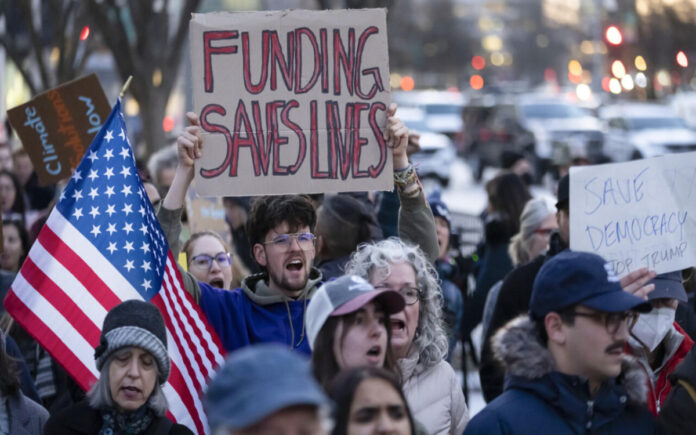Washington: A U.S. judge has extended a temporary pause on the Trump administration’s plan to freeze federal loans, grants, and other financial assistance, citing concerns that it may have overstepped Congress’s constitutional authority on government spending.
U.S. District Judge Loren AliKhan in Washington ruled that the funding freeze outlined in a memo from the White House Office of Management and Budget (OMB) last week could be “potentially catastrophic” for organizations reliant on federal funds to fulfill their missions and provide essential public services.
AliKhan’s decision, issued at the request of several advocacy groups, places the policy under two temporary restraining orders. A federal judge in Rhode Island had previously issued a similar order at the request of Democratic attorneys general from 22 states and the District of Columbia.
Last week, AliKhan had already issued a short administrative pause, preventing the OMB from implementing the freeze while she considered issuing a broader restraining order. The OMB had defended the policy as a necessary measure to ensure that federal funding aligned with President Donald Trump’s executive orders on immigration, climate change, diversity, and other matters.
Following attempts to clarify the scope of the freeze, the OMB fully withdrew the memo on Wednesday. The Trump administration argued that the withdrawal effectively rendered the lawsuit moot. However, AliKhan, an appointee of President Joe Biden, maintained that a temporary restraining order remained necessary due to ongoing funding issues and the potential for the OMB to reinstate the policy.
“Furthering the president’s wishes cannot be a blank check for OMB to do as it pleases,” AliKhan stated in her ruling. She noted that the freeze affected financial assistance totaling as much as $3 trillion—an unprecedented sum to be suspended “practically overnight.”
The judge also pointed out that the policy appeared arbitrary and might have violated Congress’s authority over government spending as outlined in the U.S. Constitution. “It did not indicate when that freeze would end (if it was to end at all),” AliKhan wrote, adding that it sought to “wrest the power of the purse away from the only branch of government entitled to wield it.”
Also Read | US Interior Department Rolls Back Biden-Era Energy Policies
Her order will remain in place while she deliberates on whether to issue a more extended preliminary injunction. The U.S. Department of Justice, which is representing the Trump administration in court, declined to comment.
Diane Yentel, president of the National Council of Nonprofits, one of the organizations that sued to block the freeze, welcomed AliKhan’s ruling. She described the policy as a “reckless attempt to halt funding.”
Also Read | US Military Deports Migrants to India in Longest Flight Yet
During a court hearing, Kevin Friedl, an attorney representing the advocacy groups from the liberal-leaning organization Democracy Forward, argued that some recipients of federal grants were still struggling to access funds despite the withdrawal of the memo and the Rhode Island judge’s ruling. “We know the policy remains in place,” Friedl told AliKhan.
Meanwhile, Daniel Schwei, an attorney for the Justice Department, defended the Trump administration’s stance, asserting that the president has the authority to guide funding priorities through executive orders. “The president is allowed to direct subordinate agencies and supervise their activities,” Schwei argued in court.



